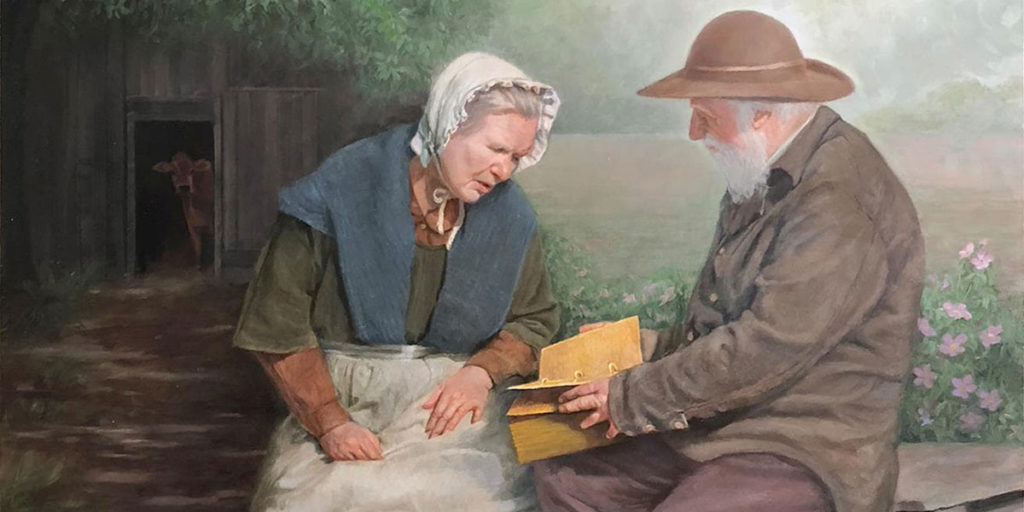Editor’s Note: The transcript of Daniel Peterson’s 2019 FairMormon Conference presentation is now available.
by Jeffrey Thayne

At the 2019 FAIR Mormon conference, Dr. Daniel Peterson gave an illuminating presentation that — among other things — summarized the history of women serving as formal witnesses. He explored how female witnesses were considered less reliable than male witnesses in many ancient and modern legal systems, including within the United States. In U.S. jurisprudence, the testimony of women was routinely dismissed over the testimony of men. In fact, women were ineligible to serve on juries in most jurisdictions, and it was not until 1973 that women could serve on juries anywhere in the U.S. These were facts that I did not know.
Last week, President Russel M. Nelson announced that women could now serve as formal witnesses to all live and proxy ordinances within the Church. This exciting development can be seen as an extension of this broader historical movement of increasing female participation in formal legal and ecclesiastical contexts. At the direction of the Lord’s servants, it is thrilling to see that participation grow as we find new and better ways for sisters within the Church to wield righteous influence within our institution.
Furthermore, we are seeing an increase in women serving as witnesses in other areas, as more sisters serve missions and participate in Church councils. We are also doing a better job of documenting the witnesses of women across time who have been historically underrepresented in the literature. In the rest of Dr. Peterson’s presentation, it relates the stories and witnesses of the women who felt, handled, or saw the plates — and there are more than you would expect. These voices and accounts serve as additional witnesses of the Restoration of the Gospel, and add to the credibility of the men who signed their witness (included at the beginning of that sacred book).
Much has been said about the credibility of those men and their account of seeing an angel, handling the plates, etc. (both the Three and the Eight), and I believe that their story is true and their witness compelling. But strangely, I find even more compelling the witness of women who — in the course of their ordinary duties — reported lifting up the heavy plates in order to dust off the table beneath. Recorded in their journals and other sources, their witness is given without pomp and circumstance, without expectation of recognition, and have hitherto been under-acknowledged as valuable testaments that Joseph Smith actually had the plates.
It is clear that the cultural assumptions of our surrounding culture — such as prior cultural assumptions that devalued the formal testimonies of women — can influence the policies and practices of the Restored Church. It may very well be that God never had any issue with women serving as witnesses to sacred ordinances, and that we are now shedding the vestiges of a culture that historically mistreated and undervalued women. But this much is equally true: this church is led by prophets and apostles who have a divine commission to institute policies and practices, and they do so while studiously consulting sacred scripture and prayerfully seeking the will of the Lord — in the early days of the Church, in the middle days of the Church, and today.
I believe that the leaders of this church receive revelation. Sometimes, that revelation will seem wholly congruent with the cultural trajectory of our society (as in this case). Other times, that revelation will seem wholly counter to the cultural trajectory of our society (as in the case of same-sex marriage and gender issues). Since it’s certainly true that our culture influences our practices and assumptions, it is tempting to “get ahead” of the prophets and draw conclusions about what is and is not a vestige of prior culture. But in this path there lies some hubris, for we are just as (if not more) fallible than our leaders, who have a much better vantage point and a much weightier spiritual mantle.
Our desire to “advance” the Church to be more congruent with shifting societal norms (on LGBT issues, for example), if left unchecked, can be just another way of making the Church and its practices even more a product of culture, rather than the reverse. The task before us is to deepen our conviction of the Restored Gospel, humble ourselves before God, and seek to sustain and support the men and women who lead this church as they lead us forward in the grand project of the Restoration of the Gospel of Jesus Christ and His divine Church. This past weekend, with the shift in policies related to women serving as formal witnesses, is an example of how exciting this can be.
 Dr. Jeffrey Thayne graduated from BYU with a bachelor’s and master’s degree in psychology. He completed his doctorate in Instructional Technology and Learning Sciences at Utah State University. He runs the popular Latter-day Saint Philosopher blog, and spends time engaging in worldview apologetics (articulating and exploring the worldview assumptions that inform our faith). He currently resides in Washington state with his wife and two children.
Dr. Jeffrey Thayne graduated from BYU with a bachelor’s and master’s degree in psychology. He completed his doctorate in Instructional Technology and Learning Sciences at Utah State University. He runs the popular Latter-day Saint Philosopher blog, and spends time engaging in worldview apologetics (articulating and exploring the worldview assumptions that inform our faith). He currently resides in Washington state with his wife and two children.

The 1973 statement is garbled. I think it is meant to be “it was not until 1973 women could serve on juries everywhere in the United States.”
Women were allowed to serve on juries in Utah from statehood. Seeing that this was granted with the vote to women might make B. H. Robert’s view that this would soul women more understandable to some.
Since the 20th amendment only specifies the vote, many states did not at that point allow women to serve on juries.
The fact that women lead out in Utah in serving on juries is worth noting. Another is that temple endowments not only allow women to be official witnesses but require it.
What is happening here is not as simple or straightforward as some suppose.